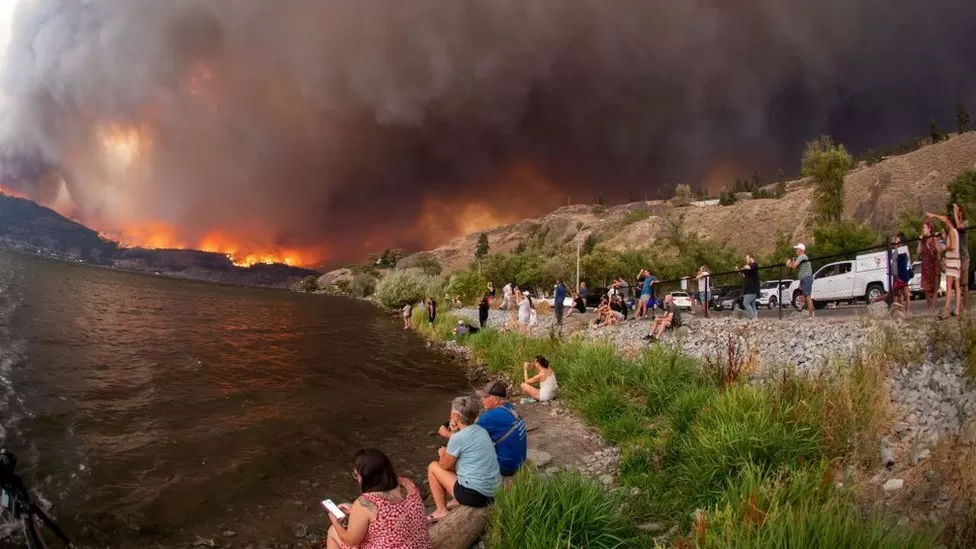Cooler weather brings hope as firefighters make progress

Firefighters have made some progress aided by cooler weather, but the “battle is not over”.
Military personnel are being deployed in the province to assist with evacuations.
Air quality warnings have also been issued due to smoke blanketing southern British Columbia and Washington state in the US.
The fires in Canada have not yet claimed any lives, but officials say some firefighters are continuing to work despite losing their homes.
On Monday, West Kelowna Fire Chief Jason Brolund said firefighters have entered the Upper Bear Creek Road neighbourhood, where the wildfire burned the most intensely.
“Trees were ripped out of their roots by a hurricane, and the force needed to do that is incredible,” he told reporters.
“Air quality has been our biggest challenge,” he said. The air is choking.”
As a result of smoke, officials have had difficulty assessing the damage.
Approximately 50 structures have burned in West Kelowna, but the most damaged areas have yet to be surveyed.
Wyre Davies, who arrived in Kelowna on Monday night, reported that the air was still hazy and there was a smell of smoke.
With cooler and calmer weather, Kelowna’s fire chief Travis Whiting says his team of 500 firefighters has made significant progress over the last four days.
There will be difficult days ahead, Mr Whiting warned on Sunday.
It covered 410 square kilometres (101,300 acres) as of Sunday afternoon.
Prime Minister Justin Trudeau announced on Sunday that the military will be deployed to British Columbia in order to assist with evacuations.
Kelowna and its surrounding areas, a popular summer tourist destination, have also been restricted. Tourists who have left have been praised for vacating hotel rooms for displaced residents.
Despite not knowing how many homes and structures have been destroyed, officials said the fire has caused “significant damage” to the communities of Scotch Creek and Celista near Shuswap Lake.
Scotch Creek’s fire department was among the buildings destroyed.
West Kelowna homes and properties have also been scorched, including the historic Lake Okanagan Resort.
An urban search-and-rescue team of 50 members, dubbed Canada Task Force 1, has been deployed to Kelowna to assess the damage. Among the team members are firefighters, police officers, engineers, and doctors.
Across the country, Canadians are watching in horror images of devastation and fires in communities they know and have friends in, Mr Trudeau said on Monday.
Environmental Canada classified regions such as the Eastern Fraser Valley and the Central Okanagan as “very high risk” on Monday morning due to smoke blanketing southern British Columbia.
As of Monday, 1,037 wildfires were burning across Canada, according to the Canadian Interagency Forest Fire Centre (CIFFC). There are about 650 of them that are considered out of control.
Washington state has declared a state of emergency due to fires burning further south. A total of 185 structures have burned, and two people have died as a result. Details about the deceased have not been released.
Thousands of people are still displaced in the Northwest Territories, but a wildfire threatening Yellowknife, the territory’s largest city, has stalled at 15 km (9 miles) from its boundary.
Hot weather in the forecast could increase dangers going into the weekend, according to officials.
The small hamlet of Enterprise in the Northwest Territories was destroyed by fire last week.
While no deaths have been reported in the latest Canadian fires, at least four firefighters have lost their lives.
As a result of climate change, wildfires are more likely to occur during hot, dry weather.
Heat that lasts for a long time draws moisture from the ground – which is a fuel for fires that can spread rapidly, particularly in strong winds.
